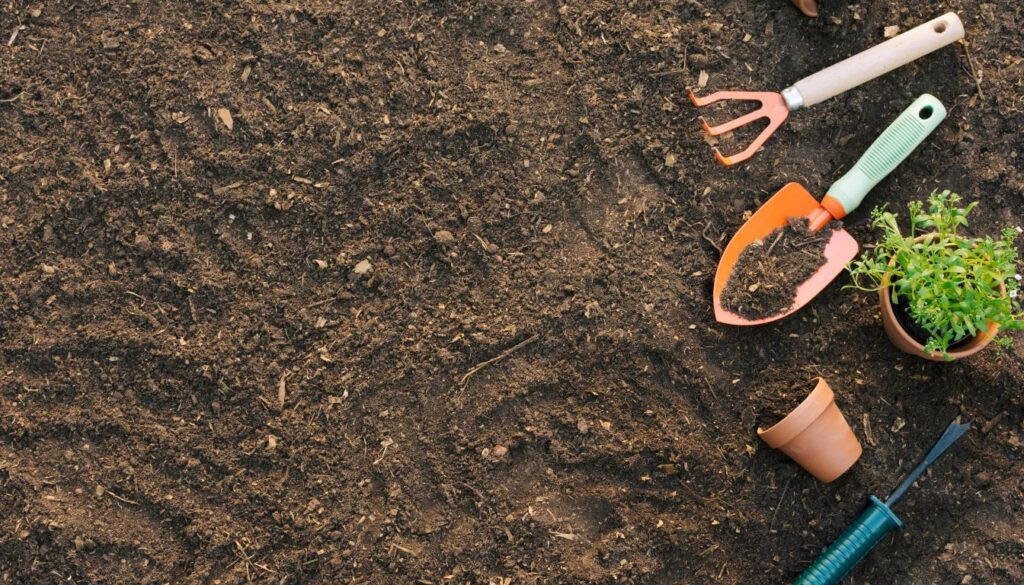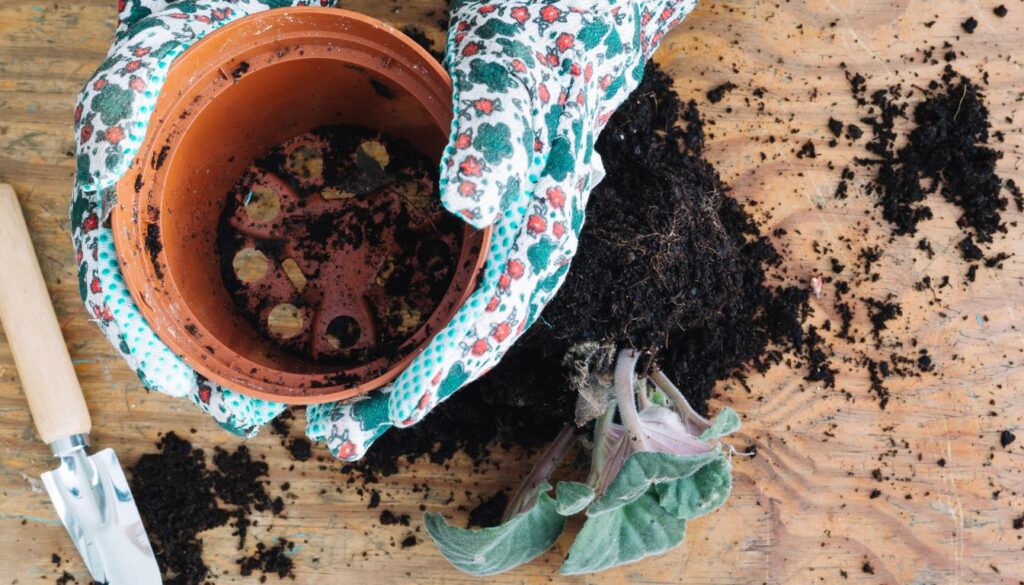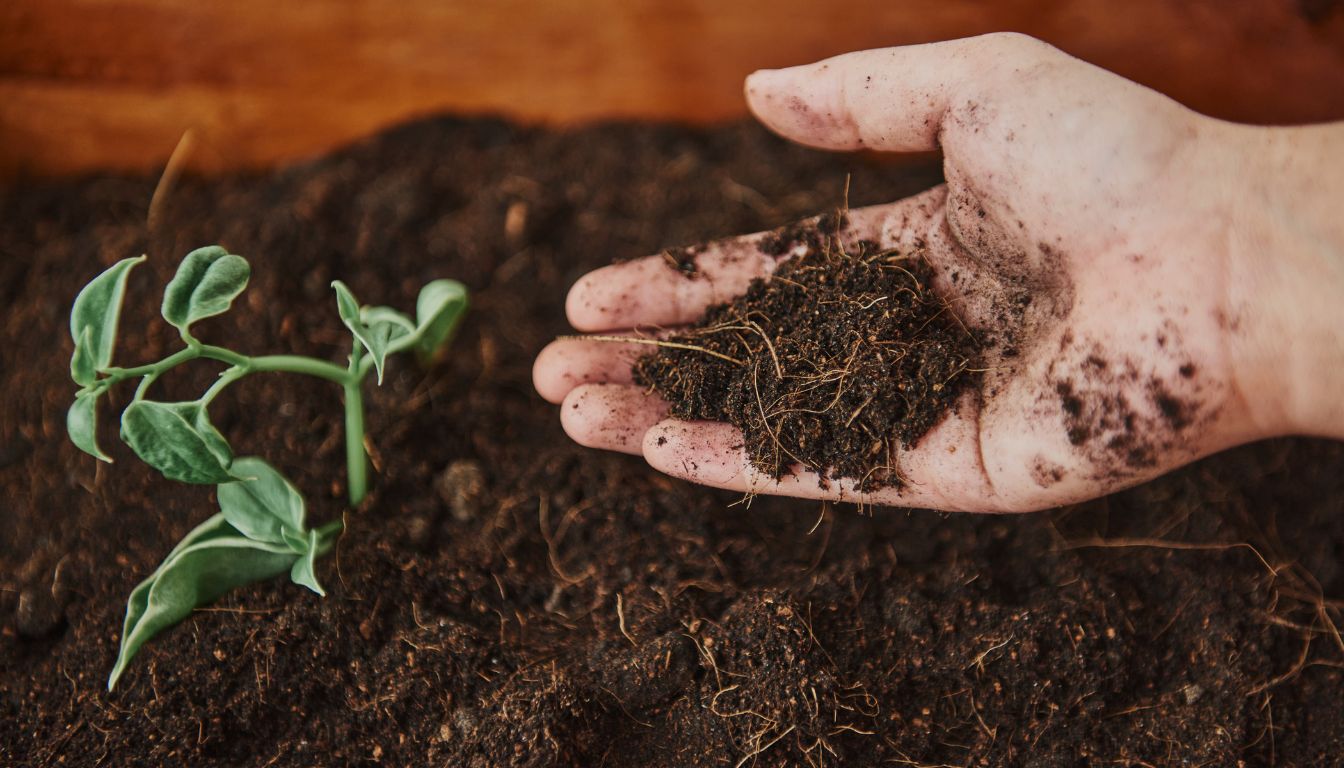Raising the pH level in soil is crucial in gardening, especially for plants needing a specific pH level. Soil acidity can affect plant growth and nutrient availability. If your soil is too acidic, you can raise the pH level by adding certain materials to the soil.
There are several ways to raise the pH level of soil. One way is to add lime to the soil. Lime is a common soil amendment that can help neutralize acidic soil. Another way is to add wood ash, which contains calcium and can also help raise the pH level of soil.
However, it’s important to note that adding too much lime or wood ash can also be harmful to plants, so it’s important to follow the recommended application rates. If you’re unsure about the pH level of your soil, it’s a good idea to test it before making any amendments. You can purchase a soil testing kit at a garden center or online.
Once you know the pH level of your soil, you can determine how much lime or wood ash to add to raise the pH level to the desired range. With the right amendments and a little bit of patience, you can raise the pH level of your soil and create a healthy environment for your plants to thrive.
Understanding Soil pH – Raise pH Level in Soil
Understanding the concept of soil pH is essential. This value measures the acidity or alkalinity of soil on a scale from 0 to 14. A pH of 7 represents neutrality, values below 7 indicate acidity, and values above 7 show alkalinity.
The Importance of pH Levels – Raise pH Level in Soil
The pH level of the soil is a critical factor in plant growth and development. Most plants grow best in soil with a pH level between 6.0 and 7.0. If the soil pH is too low, it can lead to nutrient deficiencies, while a pH that is too high can cause nutrient imbalances.
Soil pH and Plant Health
Soil pH affects the availability of nutrients to plants. For example, if the soil is too acidic, it can cause a deficiency of essential nutrients such as phosphorus, calcium, and magnesium. On the other hand, if the soil is too alkaline, it can cause the plant to absorb too much of certain nutrients, leading to nutrient toxicity.
Testing Soil pH
It is essential to test the soil pH before planting to ensure that the pH level is within the optimal range for the plants you intend to grow.
There are several ways to test soil pH, including using a pH meter or a soil test kit. A pH meter is a device that measures the pH level of the soil directly, while a soil test kit involves taking a soil sample and sending it to a lab for analysis.
The type of soil you have will also affect the pH level. Loam soils tend to have a stable pH level, while sandy soils tend to be more acidic. It is important to note that soil pH can change over time due to factors such as rainfall, fertilization, and the type of plants grown.
Natural Amendments to Raise Soil pH – Raise pH Level in Soil
I know the importance of maintaining the right pH level in the soil. Soil pH is an essential factor that affects the growth and health of plants. In this section, I will share some natural amendments that can help raise the pH level of your soil.
Using Organic Matter – Raise pH Level in Soil
One of the best ways to increase the pH level of your soil is by adding organic matter. Organic matter is rich in nutrients and can help neutralize acidic soil. You can use materials such as compost, manure, and leaf mold to improve the pH level of your soil.
Wood Ash as an Amendment
Wood ash is another natural amendment that can help raise the pH level of soil. It is rich in potassium, calcium, and other nutrients that are beneficial for plant growth. However, it is essential to use wood ash in moderation, as excessive use can lead to an increase in pH levels beyond the ideal range.
The Role of Compost
Compost is an excellent source of organic matter that can help raise the pH level of your soil. It is rich in nutrients and can help improve soil structure, water retention, and aeration. You can use compost as a top dressing or mix it into the soil to improve its pH level.
Chemical Amendments for pH Adjustment – Raise pH Level in Soil
I have found that soil pH plays a crucial role in plant growth. If the pH drops too low or rises too high, plants cannot absorb nutrients effectively, which leads to stunted growth or even death. Fortunately, gardeners can adjust soil pH by applying several chemical amendments.
Lime and Its Varieties
Lime is one of the most common chemical amendments used to raise soil pH.
It is available in several varieties, including calcitic lime, dolomitic lime, hydrated lime, and pelletized lime. Calcitic lime is made from calcium carbonate, while dolomitic lime contains both calcium and magnesium carbonate.
Hydrated lime is made by heating limestone and converting it to calcium oxide, which is then hydrated with water. Pelletized lime is a form of agricultural lime that is compressed into pellets for easy application.
Magnesium Amendments and Calcium
Calcium and magnesium serve as essential plant nutrients and also help adjust soil pH. Gardeners often apply calcium carbonate and magnesium carbonate together with lime to raise soil pH effectively. Other useful amendments include gypsum, which provides calcium sulfate, and Epsom salt, which supplies magnesium sulfate.
Baking Soda for Quick Adjustments – Raise pH Level in Soil
Baking soda, or sodium bicarbonate, is a quick and easy way to raise soil pH. It can be applied directly to the soil and will react with the soil to raise the pH. However, it is important to note that baking soda is not a long-term solution and will need to be reapplied periodically.
Application Techniques for Raising Soil pH
When it comes to raising soil pH, gardeners can choose from several techniques to achieve the desired results. In this section, I will explain some of the most effective application methods for increasing soil pH.
Proper Use of Lime
Lime works as a common soil amendment that raises soil pH. However, you must apply it properly to avoid over-application. Apply no more than 50 pounds of lime per 1,000 square feet of soil.
Applying too much lime creates an excessively high pH level, which harms plants. Different types of lime raise soil pH at different rates, so choose the right type for your soil.
Incorporating Amendments with Tools
Soil pH affects how plants absorb nutrients. For example, overly acidic soil causes deficiencies in phosphorus, calcium, and magnesium. On the other hand, highly alkaline soil makes plants absorb too much of certain nutrients, which leads to toxicity.
Watering After Application
After you apply soil amendments, water the soil thoroughly. This action distributes the amendment evenly throughout the soil and ensures proper absorption. Experts recommend watering to a depth of at least 6 inches to achieve even distribution.
Effects of Raised pH on Plant Nutrition – Raise pH Level in Soil
It is important to understand how soil pH affects plant nutrition. The pH level of soil plays a vital role in the availability of nutrients for plants. In this section, I will discuss the effects of raised pH on plant nutrition.
Nutrient Availability and pH
The pH level of soil affects the availability of nutrients for plants. When the soil pH is too low, essential nutrients such as zinc, iron, and phosphorus become less available to plants. On the other hand, when the soil pH is too high, nutrients such as potassium become less available.
Raising the pH level of soil can improve nutrient availability for plants. When the pH level is raised, the availability of micronutrients such as iron and zinc increases. This can improve plant growth and health.
Avoiding Nutrient Deficiencies
While raising the pH level can improve nutrient availability, it is important to avoid nutrient deficiencies. When the pH level is raised too high, certain nutrients become less available to plants.
For example, when the pH level is above 7.5, iron and manganese can become less available, leading to deficiencies in these micronutrients. To avoid nutrient deficiencies, it is important to monitor the pH level of soil and adjust it as needed.
Testing the soil regularly can help you determine if the pH level needs to be raised or lowered. Additionally, using a balanced fertilizer can help ensure that plants receive all the nutrients they need.
Selecting Plants for Alkaline Soils – Raise pH Level in Soil

As I mentioned earlier, some plants prefer slightly acidic soil, while others thrive in alkaline soil. If you garden in alkaline soil, you can still grow a variety of plants that suit these conditions. In this section, I will highlight plants that thrive in higher pH levels and share tips on adjusting soil pH for specific needs.
Plants Thriving in Higher pH
Some plants that are known to do well in alkaline soil include:
- Blueberries prefer acidic soil, but they can tolerate slightly alkaline soil (up to pH 6.5). If your soil is more alkaline than that, you can lower the pH by adding sulfur or peat moss to the soil.
- Azaleas and Rhododendrons: These ornamental plants prefer slightly acidic soil (pH 4.5-6.0), but they can tolerate slightly higher pH levels (up to pH 6.5). You can lower the pH of the soil by adding garden sulfur or aluminum sulfate.
- Grass such as Bermuda grass and buffalo grass prefer alkaline soil (pH 7.0-8.5). If your soil is too acidic, you can add lime to raise the pH level.
- Conifers such as junipers and pines can tolerate alkaline soil (up to pH 7.5). However, some conifers, such as spruces and firs, prefer slightly acidic soil (pH 6.0-6.5).
Adjusting Soil pH for Specific Plants
If you want to grow plants that prefer slightly acidic soil, such as hydrangeas or cruciferous vegetables, you may need to adjust the pH of your soil. Here are some tips on how to do that:
- Add garden sulfur: Garden sulfur is a common soil amendment used to lower soil pH. It is best to apply it in the fall or winter so that it has time to break down before planting in the spring.
- Use aluminum sulfate: Aluminum sulfate is another soil amendment that can be used to lower soil pH. It is usually applied in the spring and fall.
- Add garden lime: If your soil is too acidic, you can add garden lime to raise the pH level. However, not all plants tolerate high pH levels, so be sure to check the pH requirements of the plants you want to grow before adding lime to the soil.
Maintaining a Stable pH Over Time – Raise pH Level in Soil
Monitoring pH Changes
To maintain a stable pH level in the soil, it is important to monitor pH changes regularly. Testing the soil pH level every few months can help you keep track of any changes and take corrective action if necessary.
You can use a pH meter or a soil testing kit to test the pH level of your garden soil. It is important to test the soil in different areas of your garden, as the pH level may vary in different parts of your garden.
Long-Term Soil Management – Raise pH Level in Soil
Long-term soil management is crucial to maintaining a stable pH level in the soil. One way to increase soil pH is to add lime to the soil. Lime is a natural soil amendment that can help raise the pH level of acidic soil. However, adding too much lime can make the soil too alkaline, which can be harmful to plants.
Another way to increase soil pH is to add organic matter to the soil. Organic matter, such as compost, can help raise the pH level of acidic soil and improve soil structure. Compost can also help retain moisture in the soil, which can be beneficial in areas with low rainfall.
In addition to adding lime and organic matter, it is important to manage soil moisture levels. Excessive rainfall can leach nutrients and lower the pH level of the soil. On the other hand, drought conditions can increase soil alkalinity. Therefore, it is important to water the garden regularly and use mulch to help retain moisture in the soil.
Environmental Considerations and Best Practices
Impact of pH Adjustment on the Environment
It is essential to consider the environmental impact of adjusting the pH level of your soil.
Liming, which is the process of raising the pH level of soil, can have both positive and negative effects on the environment. Lime can increase the availability of nutrients in the soil, which can lead to increased plant growth and yield. However, excessive liming can lead to soil degradation, which can have negative impacts on plant growth and the environment.
Sulfur is another commonly used substance to lower the pH level of soil. While sulfur is generally considered safe for the environment, it can be harmful to certain plant species. It is important to research the specific needs of your plants before using sulfur to adjust the pH level of your soil.
Safety Measures and Protective Gear
When adjusting the pH level of your soil, it is important to take appropriate safety measures and wear protective gear. Lime and sulfur can be harmful if they come into contact with your skin or eyes. It is recommended to wear gloves, goggles, and a mask when handling these substances.
It is also important to follow the instructions on the packaging carefully and avoid over-application. Over-application of lime or sulfur can lead to soil degradation and harm to the environment.
Before You Go – Raise pH Level in Soil

Adjusting soil pH is more than a quick fix; it’s a long-term investment in plant health. By carefully choosing amendments such as lime, calcium carbonate, or magnesium-rich options, you can create the right environment for roots to absorb nutrients effectively.
Remember that raising soil pH takes time, and results may not be immediate. Regular testing ensures you stay on track and avoid overcorrection, which can harm beneficial microbes and reduce nutrient availability. Pairing amendments with good gardening practices like mulching, crop rotation, and proper watering will help maintain balance.
With patience and consistency, your soil will become more hospitable to a wide range of plants, leading to stronger growth, healthier harvests, and a thriving garden season after season.
Don’t forget to add theherbprof.com homepage to your favourites so you don’t miss out on future articles!
References – Raise pH Level in Soil
Little Herb Encyclopedia, by Jack Ritchason; N.D., Woodland Publishing Incorporated, 1995
The Ultimate Healing System, Course Manual, Copyright 1985, Don Lepore
Planetary Herbology, Michael Tierra, C.A., N.D., Lotus Press, 1988
Handbook of Medicinal Herbs, by James A. Duke, Pub. CRP Second Edition 2007
The Complete Medicinal Herbal, by Penelope Ody, Published by Dorling Kindersley
Check the Following Articles
The Amazing Process of How Chickens Lay Eggs Quickly
How to Keep Strawberries Off the Ground?
Easiest Things to Grow in a Garden: Tips for Beginners
Can I Plant Tomatoes Next to Peppers?
Frequently Asked Questions – Raise pH Level in Soil
What are effective methods to quickly increase soil pH?
Several methods can quickly increase soil pH. One common approach involves adding lime, which contains calcium carbonate that reacts with soil to neutralize acidity. You can also apply wood ash, which supplies potassium, calcium, and magnesium. Use wood ash sparingly to avoid raising the pH too high.
What techniques can be used to elevate pH levels in potted soil?
To elevate pH levels in potted soil, mix dolomite lime into the soil. This amendment provides both calcium and magnesium to boost pH. You can also apply a pH-raising fertilizer rich in calcium.
How can soil pH be increased without the use of lime?
You can raise soil pH without lime by using other alkaline materials. Bone meal, eggshells, and oyster shells all contain calcium carbonate, which helps increase pH levels.
What natural remedies are available for raising soil pH?
Compost and manure offer natural ways to raise soil pH. These materials supply nutrients like calcium and magnesium that support pH balance. You can also add slightly acidic coffee grounds to help neutralize excess acidity.
What amount of baking soda is required to raise the soil pH?
To raise soil pH with baking soda, mix 1/2 cup of baking soda with 1 gallon of water and apply it to the soil. Avoid frequent use to prevent sodium buildup.
How should one correct soil with a low pH value?
Start by testing the soil to determine its pH level. If it falls below 6.0, apply lime to increase the pH. For soil between 6.0 and 7.0, add compost or manure to improve balance. You can also use a pH-raising fertilizer to reduce acidity.
